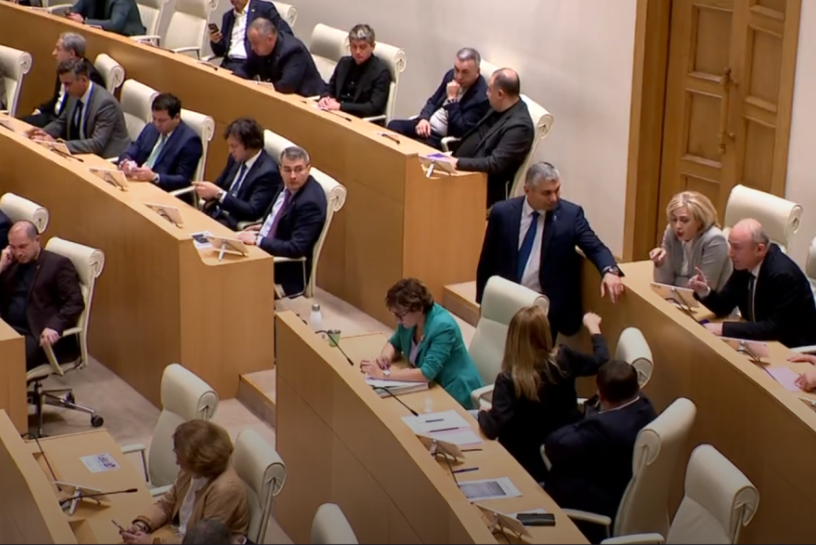საერთო ცხელი ხაზი +995 577 07 05 63


The Social Justice Center responds to the instances of sexist language used by members of the Georgian Dream party towards female politicians in the Parliament and believes that such verbal attacks create a hostile and dangerous environment. These insults aim to silence, weaken, and represent the worst manifestation of political sexism and a lack of culture.
During the October 31st plenary session of the Parliament, members of the ruling party, including Chairman of the Defense and Security Committee of the Parliament Irakli Beraia and Aluda Ghudushauri, directed gender-based hatred at opposition female MPs, specifically Teona Akubardia (who serves as the Deputy Chairman of the Defense and Security Committee) and Ana Tsitlidze, a Member of the United National Movement. They used offensive and obscene language in their statements and it was evident that these messages were prepared in advance.
It is worth noting that the use of insulting, degrading, and sexist language by members of the ruling team went unnoticed by the Chairman of the Parliament, Shalva Papuashvili. He did not call upon the MPs to refrain from using hate speech. Furthermore, in both instances, he extended the speaking time beyond what was stipulated by the regulations.
The Chairman of the Parliament's Gender Equality Council, Nino Tsilosani, shared a brief statement on social media, expressing his disapproval of the insulting behavior towards women by members of his party. However, the Gender Equality Council of the Parliament has not officially responded to this incident.
The incident received an official response only from the President of Georgia, Salome Zurabishvili, who called on the Speaker of the Parliament to respond promptly and take the strictest measures.
Additionally, the Georgian Dream party, which includes a women's organization, has yet to address internally the instances of its members using gender-based hate language. The party's women's organization has remained silent on this issue.
Female politicians in Georgia frequently find themselves targeted by attacks based on moral judgments. Gender-based hate speech against women actively involved in the public sphere often serves the deliberate purpose of excluding them from certain areas of public engagement.
Political sexism and the accompanying stereotypes have a significant impact on how the public perceives female politicians. These women often face criticism and scrutiny, not for their policies or actions, but for their appearance, behavior, personal lives, and suitability for leadership roles. This form of political sexism enforces a double standard, subjecting female politicians to more severe criticism for their conduct, language, or decisions.
As a result, this kind of discourse and environment can lead to the objectification of female politicians in media and public discussions, diverting attention away from their political positions and capabilities and focusing on their personal lives. Unfortunately, such hostile rhetoric can foster an atmosphere conducive to violence, discrimination, and harassment against women in politics.
The limited participation of women in politics, driven by economic, social, and cultural factors, is already a significant concern. When hate speech is deliberately used against women MPs in a public setting, it serves as a stark reminder that public spaces remain unsafe for women. Furthermore, such actions send a detrimental message to women engaged in even less prominent areas of general politics.
Addressing hate speech against women in politics is a challenge across all parties. Therefore, it is crucial to establish a cross-party consensus where political parties and their leaders collectively denounce hate speech and adopt a more gender-sensitive approach.
In accordance with subsection "O" of Article 3 of the Code of Ethics, it is explicitly prohibited for a member of the Parliament of Georgia to engage in insulting, obscene, sexist, discriminatory speech, actions, or any form of hate speech. Unfortunately, the Code of Ethics for Members of Parliament in Georgia lacks effective mechanisms to address instances of hate speech by MPs. According to the Code, the Parliamentary Ethics Board is empowered to publish the name and surname of a Member of Parliament who breaches the Code, along with a brief description of the violation. Additionally, the Board has the discretionary right to issue a recommendation to the individual violating ethical standards.
It's worth noting that the original draft of the Code of Ethics for Members of Parliament in Georgia initially proposed clear and stringent sanctions for ethical violations by members. These sanctions included the issuance of a recommendation card/warning, withholding of salary (ranging from 10% to 50%), and suspension of participation in official visits related to parliamentary activities for a maximum of 6 months. However, the final version of the code did not incorporate these effective sanctions for ethical breaches, instead introducing a softer mechanism involving public shaming.
Considering the above, we urge:
The website accessibility instruction